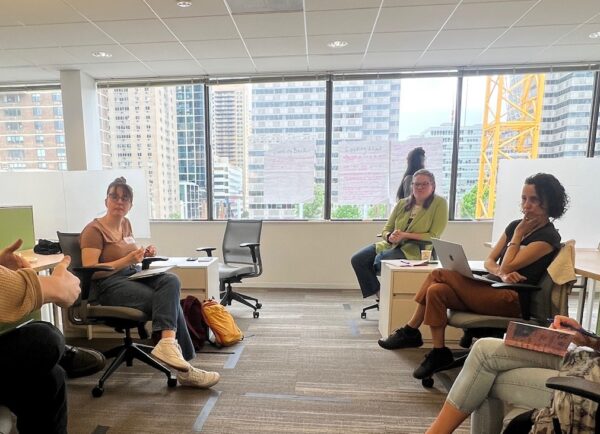 This past summer, the team at Penn State Center Philadelphia hosted a Research Summer Camp that delved into the fundamentals of social science research, exploring how critical thinking and analytical skills can create positive change in the world. The camp welcomed participants from El Comité, a committed community group advocating for the rights and welfare of immigrant workers in the restaurant industry. Spanning six virtual sessions from July to September, the initiative was facilitated by Kristen Goessling, director of participatory research at the Center, alongside Ewe Protasiuk, MA (from Temple University), and independent scholar Dr. Stephanie Skourtes.
This past summer, the team at Penn State Center Philadelphia hosted a Research Summer Camp that delved into the fundamentals of social science research, exploring how critical thinking and analytical skills can create positive change in the world. The camp welcomed participants from El Comité, a committed community group advocating for the rights and welfare of immigrant workers in the restaurant industry. Spanning six virtual sessions from July to September, the initiative was facilitated by Kristen Goessling, director of participatory research at the Center, alongside Ewe Protasiuk, MA (from Temple University), and independent scholar Dr. Stephanie Skourtes.
Carly Pourzand, director of community-driven impact at the Center, has been working closely with El Comité since its founding. Her role was to provide infrastructure, support, consultation, and language access to ensure that the camp would serve El Comité’s needs and priorities. The camp was more than a series of workshops; it was a transformative journey for El Comité members. Participants explored the foundations of social science research, learning how to ask important questions about issues they care about and using evidence to find answers. This work can be crucial for the organization’s advocacy work, equipping members with the skills to deeply understand the dynamics affecting their community and ultimately to craft data-driven strategies to support their mission.
“Research isn’t just about gathering information,” said Goessling. “It’s about understanding the stories behind the data and finding ways to use this knowledge for meaningful change. When communities conduct their own research, they shift from being subjects of study to being active producers of knowledge and authors of the narrative. This changes the way policies are created and how power is negotiated.”
The camp’s curriculum began with a pre-session focused on community building, fostering a collaborative atmosphere where participants could share their motivations and perspectives on learning and influence. This session was guided by the questions, “What do we want to learn? How do we best learn?” The introductory sessions then provided a comprehensive overview of what constitutes research and the history of social science, addressing critical questions like “What is science? What are the origins of social science research?”
Subsequent sessions delved into essential topics such as research ethics, various data collection and analysis methods, and knowledge dissemination. Facilitators emphasized the importance of ethical research standards and maintaining rigorous and trustworthy work. All participants completed the CIRTification: Community Involvement in Research Training from the University of Illinois at Chicago. This human research protections training is a free online course available in multiple languages, including Spanish, and designed for community collaborators.
“It was great to see the CIRTification offered in Spanish; we did have to offer further language justice strategy in order to make the training truly accessible for Spanish-speakers who are newer to digital literacy,” said Pourzand.
They also provided practical lessons and guided exercises on research methods where participants had the opportunity to get hands-on experience in gathering and analyzing data, and turning raw data into actionable findings. This approach demonstrated that research is more than just theory; it’s a powerful tool for advocacy and community-driven social change
The final session of the camp focused on knowledge translation and effectively communicating research findings. Participants explored how data can inform organizing campaigns and drive policy change. The ability to analyze data, draw conclusions, and present findings provides valuable tools to amplify El Comité’s expertise.
The camp concluded with an inspiring realization: research is not limited to academic circles. It belongs in the hands of those most affected by the issues being studied, serving as a critical tool for advocacy and social change.
“This gives me the opportunity to interact with more coworkers and make new friends, do outreach and develop social skills.” — Participant feedback [translated from Spanish to English with minimal edits]
